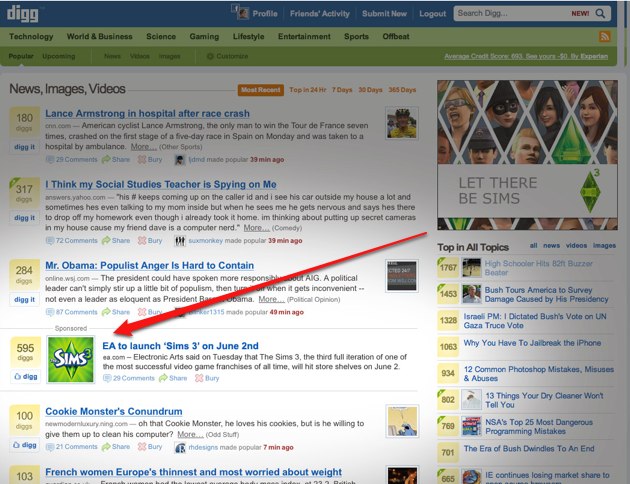
Late last year we wrote about an experimental advertising product that Digg was developing:
One experiment Digg is working on, says one source close to the company, is a self service advertising product that will be somewhat similar to Google Adwords, but with a twist. The product would insert advertisements into the Digg news stream (presumably clearly marked). Where those ads end up, and how much an advertiser pays per click, would be based on user feedback.
So users would have the ability to vote on advertisements in the same way they vote on stories. The better ads, as determined by Digg users, will get more prominent placement and a lower cost-per-click.
Compare that to the blog post from Digg a few minutes ago announcing a new advertising product:
Today, we’re announcing our plans to roll out a new advertising platform — Digg Ads. Digg Ads will give you more control over which advertisements are displayed on Digg. The more an ad is Dugg, the less the advertiser will have to pay. Conversely the more an ad is buried, the more the advertiser is charged, pricing it out of the system.
The platform will launch as a pilot in a few months, and it will be an ongoing work in progress as we learn more from the Digg community and adjust the system. We’re still in very early stages of working with advertisers and building the system, but we wanted you to be the first to hear about our plans.
Digg Ads will appear alongside stories in the river. The sponsored content will look and feel similar to regular Digg content, but will be clearly marked as sponsored. It may link to stories, video trailers, independent product reviews – many of the same types of content you see on Digg every day. The goal here is to give advertisers a way to present content related to their brands and get immediate input on whether it’s relevant to the Digg audience, or not.
New Digg ads will appear directly in the news stream and will be clearly marked as sponsored. The more people click on the ads, the lower the price the advertiser will pay. Ads that are buried too often will be priced “out of the system.”